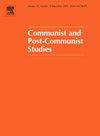新自由主义化与羞辱政治
IF 1.3
4区 社会学
Q3 INTERNATIONAL RELATIONS
Communist and Post-Communist Studies
Pub Date : 2021-06-01
DOI:10.1525/J.POSTCOMSTUD.2021.54.1-2.102
引用次数: 1
摘要
本研究借鉴了诺伯特·埃利亚斯的写作和情感文学社会学,提出将新自由主义视为一个“文明化过程”,这是由羞辱政治促成的。通过追踪20世纪90年代新自由主义变革引发的两股抗议浪潮——农民和教师——以及统治精英如何在大众媒体上公开处理这些抗议,本文发现,在后苏联和新自由主义的拉脱维亚,在国家和社会之间的紧张时刻,统治是通过一种羞辱政治发生的,这种政治利用了三种工具:一个好公民的新自由主义意识形态、本质化语言和分裂语言。这篇文章有助于后苏联研究的学术,这是一个不断增长的学术机构,探索新自由主义与情感之间的关系,以及社会运动文学。本文章由计算机程序翻译,如有差异,请以英文原文为准。
Neoliberalization and Politics of Shaming
Drawing on Norbert Elias’s writing and sociology of emotion literature, this study proposes viewing neoliberalization as a “civilizing process,” which is enabled by politics of shaming. By tracing two streams of protests triggered by neoliberal transformations—by farmers and schoolteachers—in the 1990s and how they were handled by the ruling elite publicly in the mass media, this article finds that, in post-Soviet and neoliberal Latvia, in moments of tension between the state and society, rule occurred through a politics of shaming that utilized three instruments: the neoliberal ideology of a good citizen, essentializing language, and dividing language. This article contributes to the post-Soviet studies’ scholarship, the growing body of scholarship that explores relationships between neoliberalization and emotions, as well as social movements literature.
求助全文
通过发布文献求助,成功后即可免费获取论文全文。
去求助
来源期刊

Communist and Post-Communist Studies
Multiple-
CiteScore
1.90
自引率
0.00%
发文量
23
期刊介绍:
Communist and Post-Communist Studies is an international journal covering all communist and post-communist states and communist movements, including both their domestic policies and their international relations. It is focused on the analysis of historical as well as current developments in the communist and post-communist world, including ideology, economy and society. It also aims to provide comparative foci on a given subject by inviting comments of a comparative character from scholars specializing in the same subject matter but in different countries.
 求助内容:
求助内容: 应助结果提醒方式:
应助结果提醒方式:


